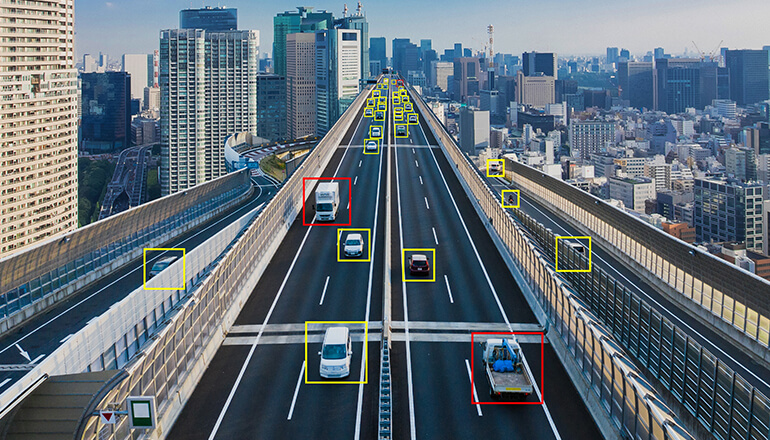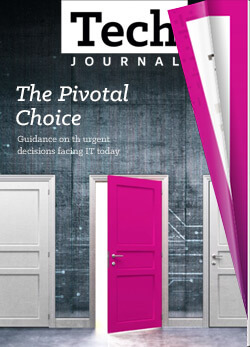Tech Journal The Quantico Cyber Hub Is Redefining Cybersecurity. Here’s How.
By Robin Adair / 14 Sep 2021 / Topics: Artificial Intelligence (AI) Modern workplace Cloud Cybersecurity

A center for cyber defense innovation and research, the Quantico Cyber Hub (QCH) is paving a path for a stronger, more strategic tomorrow for government agencies, military branches and education institutions alike.
From costly shutdowns and repairs to potential legal battles and a damaged reputation, no organization wants to deal with the fallout after a cybersecurity breach — especially in the public sector, where threats are ever-present and potentially more devasting.
Brimmed with troves of sensitive information, public sector organizations are prime targets for cybercriminals. And with the average public sector data breach taking 324 days to contain, according to a 2020 IBM report, organizations have no time to waste when bolstering their security ecosystem. As threats mature, organizations need a solution that won’t just serve them in the short term, but also expand as attacks rapidly evolve.
What is the Quantico Cyber Hub (QCH)?
A collaboration between the Cyber Bytes Foundation, Insight Public Sector and 15 top technology partners, the QCH is a state-of-the-art cyber education, research and innovation facility located in Quantico, Virginia, near the headquarters of the U.S. Marine Corps and just outside of the nation’s capital.
The QCH supports the Cyber Bytes Foundation’s mission to establish and sustain a unique cyber ecosystem for education, innovation and outreach programs tailored for developers and the cyber workforce. The nation’s top cybersecurity subject matter experts work from the 30,000-square-foot facility to build custom solutions and accelerate advanced cyber technology implementations. They partner with industry thought leaders to develop robust, vendor-agnostic solutions for tackling the nation’s toughest cyber challenges.
According to the Emsisoft Malware Lab, 113 federal, state, and municipal governments and agencies affected were impacted by ransomware attacks in 2020.
Pilots and simulations
Using collaborative technology from leading technology providers, the QCH features pilot and simulation labs to showcase the latest cutting-edge solutions for thwarting even the most complex threats. Featured simulation labs include:
- Secured 5G
- Artificial Intelligence (AI) and machine learning
- Virtual/augmented/mixed reality
- Cloud (public, hybrid, tactical)
- Cybersecurity
- DevSecOps
- Modeling/simulation
- Wargaming
Thanks to designs created by the industry’s top experts and architects, users can view simulations in real time, allowing them to gain an in-depth understanding about particular technology solutions before creating their own customized solution. This preview empowers agencies to fully learn how the solution can help solve their needs.
Plus, users can further their confidence in the solutions by gaining the know-how on operating these systems through the QCH’s Cyber Bytes Academy, a dedicated cyber education and training space. Here, users can get equipped with the skills to tackle the toughest impending cyberattacks, through lessons ranging from the fundamentals of cybersecurity to advanced courses.
Cyber solutions in action
A hallmark of the QCH is the 5G lab, a multivendor proving ground for 5G and other mobility solutions to build, test and evaluate 5G communications platforms. Among other use cases, the 5G lab aims to solve wireless communications challenges within the government and Department of Defense spaces.
For example, soldiers in remote locations out in the field can experience spotty wireless connection — potentially causing a devastating disconnect and threatening mission-critical objectives. Using 5G technology developed at the QCH, those on the ground can carry a reliable, secure mobile solution for quick and dependable connection. With the solution in hand, users can be confident that communication channels will remain connected in any situation.
In the lab, users can run simulations and Proof of Concept (PoC) exercises for a variety of field trials, demonstrating a range of capabilities for different use cases. Piloting the solutions allows the user to identify potential vulnerabilities in real time and quickly pivot to resolve any weaknesses or concerns before building a full solution.
Cyber research and innovation
In addition to the labs, the QCH will also be the future home to a Sensitive Compartmented Information Facility (SCIF). A SCIF is a space used by government agencies and the military, designed to securely store confidential material and offer a protected, private location for classified conversations. For organizations that wish to demonstrate a PoC, the SCIF will allow them to use classified government data and run scenarios in a real-time environment.
Also in part with its mission to serve as a center for research and innovation, the QCH boasts a top-class cyber range for professionals to proactively train for cyberthreats in a realistic ecosystem — without compromising sensitive data. Cyber ranges can simulate the most threatening cyberattacks, equipping professionals with the practice and skills to instill confidence in the case of a true risk. Regular cyber range training can ensure professionals are adequately skilled and prepared in the case of a cyberattack.
Cyber ranges can simulate the most threatening cyberattacks, equipping professionals with the practice and skills to instill confidence in the case of a true risk.
Cyber operations
The brain behind much of the facility’s operations is the Security Operations Center, better known as the SOC. The SOC is a dedicated space for monitoring and managing ongoing cyberthreats, equipped with a team of experts responsible for constantly detecting and responding to vulnerabilities. With hackers always on the clock, the SOC allows for increased visibility of potential threats at every hour of the day — making sure organizations are never caught off guard.
Technologies in use at the SOC include intrusion detection/prevention systems, security information and event management systems, data loss prevention software, and threat intelligence and vulnerability management platforms. With a well-equipped SOC, organizations can trust that any incoming threats will be halted in a timely, effective manner.
With hackers always on the clock, the SOC allows for increased visibility of potential threats at every hour of the day — making sure organizations are never caught off guard.
A mission-focused future
Public sector cybersecurity has unique IT challenges compared to the private sector. And a constantly evolving threatscape means organizations need an ironclad solution in place to respond to risks at a moment’s notice.
With the rapid advancement of digital technology solutions, the future of cybersecurity for the nation’s military, government agencies and schools is in for boundless transformation. Gone are the days when organizations had few-and-far-between options to protect their networks. From AI and the Internet of Things (IoT) to virtual reality technology, organizations today have the power to customize solutions that best fit their mission.
A collaborative effort between distinguished leaders in the industry, the QCH is pioneering a future for all-encompassing, customized security solutions to better prepare organizations for the flood of threats faced daily. By embracing and leveraging the capabilities of strategic, vendor-agnostic solutions, a new beginning is shaping for public sector cybersecurity — starting today and building for tomorrow.
























